|
|
|
Sort Order |
|
|
|
Items / Page
|
|
|
|
|
|
|
| Srl | Item |
| 1 |
ID:
133289
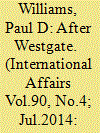

|
|
|
|
|
| Publication |
2014.
|
| Summary/Abstract |
The attack on the Westgate Mall in Nairobi, Kenya, in September 2013 intensified international scrutiny of the war against Harakat Al-Shabaab Mujahideen (Movement of the Warrior Youth). This article analyses the current state of affairs with reference to the three principal sets of actors in this war: Al-Shabaab, the African Union Mission in Somalia (AMISOM) and its international partners, and the various actors currently involved in building the Somali Federal Government's security forces. It argues that although the newly reconfigured Al-Shabaab poses a major tactical threat in Somalia and across the wider Horn of Africa, the movement is becoming a less important actor in Somalia's national politics. As Al-Shabaab loses territory and its popularity among Somalis continues to dwindle, other clan- and region-based actors will become more salient as national debates over federalism, the decentralization of governance mechanisms beyond Mogadishu and the place of clannism will occupy centre stage. As a consequence, AMISOM's principal roles should gradually shift from degrading Al-Shabaab towards a broader stabilization agenda: encouraging a national consensus over how to build effective governance structures; developing an effective set of Somali National Security Forces; and ensuring that the Federal Government delivers services and effective governance to its citizens, especially beyond Mogadishu in the settlements recently captured from Al-Shabaab. As it stands, however, AMISOM is not prepared to carry out these activities. More worryingly, nor is the Somali Federal Government.
|
|
|
|
|
|
|
|
|
|
|
|
|
|
|
|
| 2 |
ID:
144184
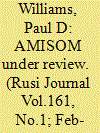

|
|
|
|
|
| Summary/Abstract |
Since mid-2013 AMISOM has undergone a series of strategic reviews aimed at strengthening the mission, and since early 2014 it has conducted four major operations aimed at taking the fight to Al-Shabaab. Although these operations have enjoyed some successes, AMISOM continued to confront four major challenges that badly hindered its ability to achieve its mandated tasks. Paul D Williams explores these challenges – both internal and external to AMISOM – and argues that AMISOM cannot be expected to implement a successful exit strategy unless these issues are addressed.
|
|
|
|
|
|
|
|
|
|
|
|
|
|
|
|
| 3 |
ID:
073214
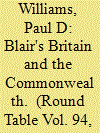

|
|
|
| 4 |
ID:
171208


|
|
|
|
|
| Summary/Abstract |
Over a decade of security force assistance (SFA) initiatives to build an effective Somali National Army (SNA) failed because of the interrelated effects of political, contextual and operational challenges. The key political challenges were interest asymmetry between international actors and Somali elites, insufficient focus on institution-building and a lack of donor coordination. The principal contextual challenges in Somalia were the legacies of two decades of state collapse and the negative effects of clan dynamics. The main operational challenges were building an army while simultaneously fighting a war, the complexities of military integration, and the severe capability gaps afflicting the SNA.
|
|
|
|
|
|
|
|
|
|
|
|
|
|
|
|
| 5 |
ID:
077664
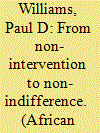

|
|
|
|
|
| Publication |
2007.
|
| Summary/Abstract |
This article employs the concepts of security culture and norm localization to explore some of the cultural dimensions of the African Union's (AU) security policies. After providing an overview of constructivist accounts of norm socialization in international relations, I use these insights to analyse the origins and development of the AU's security culture. The final two sections explore the ongoing process of norm localization in relation to the two most recent tenets of the AU's security culture: intolerance of unconstitutional changes of government and the responsibility to protect principle. An awareness of the uneven and contested nature of this process helps account for the fact that although these two transnational norms have been institutionalized in the AU Charter and endorsed by the United Nations, they have been internalized unevenly by the AU's member states. External advocates of these two norms would thus do well to help the continent's norm entrepreneurs build congruence between these norms and the AU's security culture.
|
|
|
|
|
|
|
|
|
|
|
|
|
|
|
|
| 6 |
ID:
192015
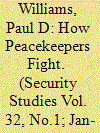

|
|
|
|
|
| Summary/Abstract |
Contrary to popular perceptions, United Nations (UN) peacekeepers engage in combat fairly frequently. A central challenge facing the UN is thus calibration between force and politics: ensuring the organization’s combat power is harnessed to viable political strategies for peace. However, the epistemic community on peacekeeping remains deeply divided between skeptics and proponents of “robust” operations, where peacekeepers are expected to use force to implement mission mandates. This article suggests that militarily effective, robust peacekeeping is most important for improving civilian protection and ensuring mission credibility in theaters where there is no peace to keep; proposes a novel framework and typology to assess combat effectiveness in UN peace operations; and compiles descriptive statistics for the 1948–2020 period. Finally, case studies of four battles involving UN peacekeepers in the Democratic Republic of the Congo illuminate the conditions that are conducive to the UN’s combat effectiveness.
|
|
|
|
|
|
|
|
|
|
|
|
|
|
|
|
| 7 |
ID:
061169
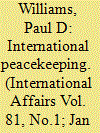

|
|
|
| 8 |
ID:
092129
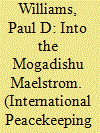

|
|
|
|
|
| Publication |
2009.
|
| Summary/Abstract |
The African Union mission in Somalia (AMISOM) endured a difficult first 30 months of operations. Deployed into an active war-zone, it was not long before an international debate began to revolve around how the mission should be brought to an end. This article analyses the main challenges as well as the most important local and international dynamics that affected the operation. It concludes that AMISOM was an ill-conceived mission that attracted few serious political champions partly because of the dangerous environment in which it operated and partly because of its lack of stable funding and capabilities. The predictable results were a dangerously under-resourced operation that placed peacekeepers in harm's way for morally and politically dubious reasons.
|
|
|
|
|
|
|
|
|
|
|
|
|
|
|
|
| 9 |
ID:
068277
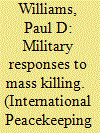

|
|
|
| 10 |
ID:
105714
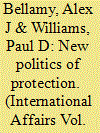

|
|
|
|
|
| Publication |
2011.
|
| Summary/Abstract |
In March 2011, the UN Security Council authorized the use of force to protect civilians in Libya. This was the first time that the Council has ever authorized the invasion of a functioning state for such purposes. International society's relatively decisive responses to recent crises in Côte d'Ivoire and Libya has provoked significant commentary, suggesting that something has changed about the way the world responds to violence against civilians. Focusing on these two cases, this article examines the changing practice of the UN Security Council. It argues that we are seeing the emergence of a new politics of protection, but that this new politics has been developing over the past decade. Four things are new about this politics of protection: protecting civilians from harm has become a focus for international engagement; the UN Security Council has proved itself willing to authorize the use of force for protection purposes; regional organizations have begun to play the role of 'gatekeeper'; and major powers have exhibited a determination to work through the Security Council where possible. However, the cases of Côte d'Ivoire and Libya also help to highlight some key challenges that might halt or reverse progress. Notably, states differ in the way they interpret mandates; questions are being asked about the UN's authority to act independently of specific Security Council authorizations; the overlap of regional organizations sometimes sends conflicting messages to the Security Council; and there remains a range of difficult operational questions about how to implement protection mandates. With these in mind, this article concludes with some suggestions about how the future challenges might be navigated in order to maintain the progress that has been made in the past decade.
|
|
|
|
|
|
|
|
|
|
|
|
|
|
|
|
| 11 |
ID:
117057
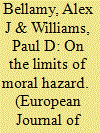

|
|
|
|
|
| Publication |
2012.
|
| Summary/Abstract |
Advocates of moral hazard theory argue that the 'responsibility to protect' causes genocidal violence that would not otherwise occur. After summarizing the main elements of the moral hazard approach, this article demonstrates that there is no empirical evidence to support the general claim that the 'responsibility to protect' is a remote cause of genocide. This is followed by an analysis of the conflicts in Bosnia, Kosovo and Darfur which demonstrates that moral hazard does not provide a plausible account of the proximate causes of genocidal violence in these cases. We suggest that a major part of the explanation for why moral hazard theory performs so badly is its reductionist account of the dynamics of armed conflict and its simplistic understanding of the dynamics of provocation.
|
|
|
|
|
|
|
|
|
|
|
|
|
|
|
|
| 12 |
ID:
133250
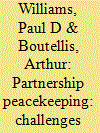

|
|
|
|
|
| Publication |
2014.
|
| Summary/Abstract |
The relationship between the United Nations (UN) and the African Union (AU) has at times been characterized by considerable conflict, mistrust, and tension, often hindering the predictability and conduct of effective peace operations. This article analyses the challenges facing UN-AU cooperation on peace and security issues and examines their partnerships in various peace operations. Specific attention is paid to the crucial cases of Somalia and Mali, which exemplify some of the positive and negative aspects of this relationship. We argue that while great power politics and the international normative context have played important roles in structuring debates about peace operations in contemporary Africa, so too have two more bottom-up factors: the specific operational and financial challenges generated by the AU's big missions in Darfur, Somalia, and Mali, and the organizational cultures and bureaucratic constraints within which both institutions have had to work. Greater focus on these bottom-up factors could bring significant improvements to the decision-making processes in Addis Ababa and New York, to operational responses, and to the conduct of peace operations.
|
|
|
|
|
|
|
|
|
|
|
|
|
|
|
|
| 13 |
ID:
092175
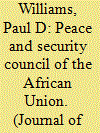

|
|
|
|
|
| Publication |
2009.
|
| Summary/Abstract |
How has the Peace and Security Council (PSC) of the African Union helped promote peace, security and stability on the African continent? This article assesses the PSC's activities in light of insights generated by the literature on international security institutions. After providing an overview of the immediate origins of the PSC, it discusses five elements of the Council's institutional design. It then evaluates the PSC's activities during its first five years (2004-9), by examining the Council's political relevance, its efficiency and productivity, and whether it is the institution best placed to deal with the continent's security problems. It concludes that the PSC's future will hinge on whether more of the African Union's members can be persuaded to devote more serious levels of resources (human and financial) to it.
|
|
|
|
|
|
|
|
|
|
|
|
|
|
|
|
| 14 |
ID:
177761
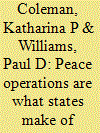

|
|
|
|
|
| Summary/Abstract |
Peace operations are a highly resilient international institution for managing armed conflict. Their resilience derives from what constructivists in International Relations theory call collective intentionality and the malleable constitutive rules that define and structure such missions. Despite a range of current constraints, challenges, and crises, peace operations are unlikely to become extinct unless a critical mass of states consistently withdraw material support for them and explicitly denigrate the concept of peace operations itself. We see little evidence that both these things are likely to occur. However, the constitutive rules guiding peace operations are likely to continue to evolve due to ideational and material changes. While the proliferation of actors and mission types makes precise predictions impossible, we expect an evolution both in how various actors define their own peace operations and how these actors relate to each other.
|
|
|
|
|
|
|
|
|
|
|
|
|
|
|
|
| 15 |
ID:
114218
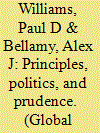

|
|
|
| 16 |
ID:
085125
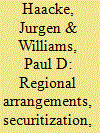

|
|
|
|
|
| Publication |
2008.
|
| Summary/Abstract |
This article seeks to contribute to debates about how regional arrangements construct and respond to threat agendas. It does so by using the literature on the concept of securitization to explore the processes through which the African Union (AU) and the Association of Southeast Asian Nations (ASEAN) have dealt with contemporary transnational challenges. After providing an overview of the Copenhagen School's (CS) understanding of securitization, we examine the main problems and limitations that emerge when attempting to apply the concept of securitization to regional arrangements in the developing world. The article explores in particular the extent to which the AU and ASEAN have securitized the transnational challenges on their agendas. We conclude that in both cases the impact of security culture as well as unresolved conceptual and methodological issues raise significant questions when seeking to apply securitization theory outside of Europe.
|
|
|
|
|
|
|
|
|
|
|
|
|
|
|
|
| 17 |
ID:
061171
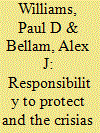

|
|
|
| 18 |
ID:
171205
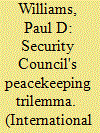

|
|
|
|
|
| Summary/Abstract |
The United Nations (UN) Security Council is stuck in a peacekeeping trilemma. This is a situation where the Council's three strategic goals for peacekeeping operations—implementing broad mandates, minimizing peacekeeper casualties and maximizing cost-effectiveness—cannot be achieved simultaneously. This trilemma stems from longstanding competing pressures on how the Council designs UN peacekeeping operations as well as political divisions between peacekeeping's three key groups of stakeholders: the states that authorize peacekeeping mandates, those that provide most of the personnel and field capabilities, and those that pay the majority of the bill. Fortunately, the most negative consequences of the trilemma can be mitigated and perhaps even transcended altogether. Mitigation would require the Council to champion and implement four main reforms: improving peacekeeper performance, holding peacekeepers accountable for misdeeds, adopting prioritized and sequenced mandates, and strengthening the financial basis for UN peacekeeping. Transcending the trilemma would require a more fundamental reconfiguration of the key stakeholder groups in order to create much greater unity of effort behind a re-envisaged peacekeeping enterprise. This is highly unlikely in the current international political context.
|
|
|
|
|
|
|
|
|
|
|
|
|
|
|
|
| 19 |
ID:
108743
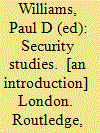

|
|
|
|
|
| Publication |
London, Routledge, 2008.
|
| Description |
xxiv, 552p.
|
| Standard Number |
9780415425629
|
|
|
|
|
|
|
|
|
|
|
|
Copies: C:1/I:0,R:0,Q:0
Circulation
| Accession# | Call# | Current Location | Status | Policy | Location |
| 056377 | 355.033/WIL 056377 | Main | On Shelf | General | |
|
|
|
|
| 20 |
ID:
131136


|
|
|
|
|
| Publication |
2014.
|
| Summary/Abstract |
From late 2012, the African Union Mission in Somalia (AMISOM) had adopted a largely defensive posture, citing limited resources as the principal reason for this. However, increasing numbers of Al-Shabaab attacks both inside and outside Somalia have forced AMISOM and its partners to open a new phase in the war against the group. To that end, in November 2013 the UN Security Council called for AMISOM to be enhanced in several areas and in January 2014 the mission adopted a new Concept of Operations. These developments facilitated a new wave of offensive operations conducted in tandem with the Somali National Security Forces. Nevertheless, AMISOM still confronts some familiar - and fundamental - challenges in its efforts to stabilise Somalia.
|
|
|
|
|
|
|
|
|
|
|
|
|
|
|
|
|
|
|
|
|